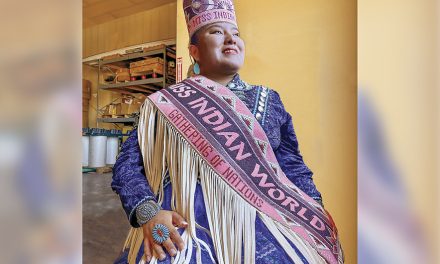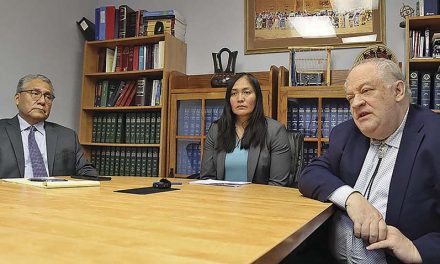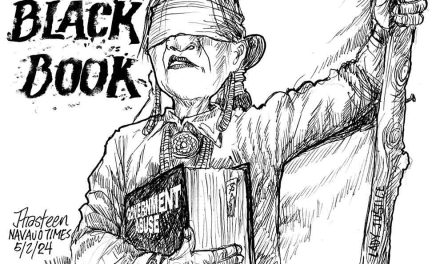
Nakai, Macdonald spar over unemployment
It was only 10 days until the tribe would elect a new chairman and the two candidates were spending almost all of their time on the campaign trail. According to the Navajo Times, there was not a lot of difference between the two candidates when it came to addressing the problems facing the tribe and its members.
Both Raymond Nakai, the current chairman, and Peter MacDonald, the former director of the Office of Navajo Economic Opportunity, had promised to tackle the reservation’s unemployment problem head-on. In speeches made the previous weekend, both said they would be able to create more new jobs than their opponent.
Nakai pointed to figures that showed he had been able to create more than 3,000 jobs during the past four years. Using the creation of Fed Mart, the first supermarket on the reservation, as an example, he pledged to bring supermarkets to all of the major reservation communities in the next four years. MacDonald also promised to create thousands of new jobs annually by both encouraging Navajos to start small businesses on their own, and pledging help from tribal economic officials to help them get the businesses started and keep operating.
This came at a time when, except for trading posts, there were few small businesses on the reservation, with most of them owned and operated by non-Navajos. In fact, the two biggest centers of small business were located just across the reservation line near Window Rock and Shiprock.
The problem was the federal government, which placed so many requirements on startups that it took a good bankroll and a lot of patience to get through the process. Getting one set up in six or seven months was a rarity while many took years.
The efforts by Lloyd House are a good example of the problems in those days with getting a new business set up. In 1971, he got the idea of building a bowling alley in the Window Rock area.
He said one of the main problems in living on the reservation was the lack of entertainment at night for teenagers and young adults. He thought a bowling alley would be a sound investment, and started looking for land to build his new business. After months of effort, he found a site behind the Window Rock Motor Inn. He then spent months getting the various permits and immediately ran into trouble with federal regulations requiring him to show he had the financial backing to build and operate the new business.
He was also required to post a bond to guarantee he had the financial backing to pay his bills.
In the 80s, with the bowling alley still a dream, House said he had tried for years to make it a reality but something always seemed to come up. When he had the financing backing, he would have problems complying with one of the dozens of regulations, and when he seemed to have met all of the regulations, the financial backing was not there.
MacDonald said one of his top priorities was to severely reduce the number of regulations required to set up a new business. Nakai, on the other hand, said his main priority was to bring in major companies like General Dynamics and Fed Mart, which would create hundreds of jobs annually.
These two concepts — reducing regulations required to start businesses on the reservation and getting major companies to set up operations — would dominate politics for the next 50 years, with everyone who ran for the top spot saying they would make this their No. 1 priority if they were elected. In hindsight, it seemed that MacDonald had the election in the bag given his victory in the primary and the enthusiasm his supporters showed at the rallies. But that was not the case.
Nakai argued that a lot of his supporters did not bother to vote in the primary, believing he had the primary wrapped up. He also pointed out that a lot of MacDonald’s support came from the younger generation and everyone knew that elderly Navajos controlled the elections.
He had complete faith that members of the tribe who belonged to the Native American Church would support him for the role he played during the past few years in making it legal for them to use peyote in ceremonies. The NAC at the time was claiming to have more than 30,000 members on the reservation and Nakai felt that, like in his past two victories, this would be enough to get him elected.
Sam Steiger, the congressman from the First District in Arizona, was a strong supporter of the Hopi Tribe in its land dispute with the Navajos. He said this week 50 years ago that he was planning to submit a proposal to the House of Representatives that would partition the 1.8 million acres of disputed land, with the Hopi getting one section and the Navajos the other.
He was proposing placing the following Navajo chapters in the Hopi partitioned area: Tonalea, Forest Lake, Coal Mine Mesa, Jeddito, Teesto and Hard Rock. Navajo families who lived in those chapters would have to pay a fee to the Hopis annually to be allowed to stay on their land and those who refused to pay would be evicted.
The plan also allowed for the Hopi Tribe to have complete authority over their section. When Navajo officials heard of the plan, they were shocked because they still believed that there was a solution that would allow the Navajo families to stay on their land and be under the jurisdiction of the Navajo Tribe.








 Highway 264,
Highway 264, I-40, WB @ Winslow
I-40, WB @ Winslow